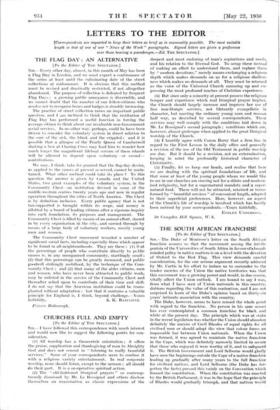THE FLAG DAY : AN 'ALTERNATIVE
LETTERS TO THE EDITOR
[Correspondents are requested to keep their letters as brief as is reasonably possible. The most suitable length is that of one of our " News of the Week" paragraphs. Signed letters are given a preference over those bearing a pseudonym.—Ed. THE SPECTATOR.] [To the Editor of THE SPECTATOR.]
Sin,—Every other day, almost, in this month of May has been a Flag Day in Lertdon, and we must expect a continuance of the series at least until the culminating date of the street collections at midsummer. It is obvious that this method must be revised and drastically restricted, if not altogether abandoned. The purpose of collection is defeated by frequent Flag Days ; a growing public annoyance is discernible, and we cannot doubt that the number of our fellow-citizens who resolve not to recognise boxes and badges is steadily increasing.
The practice of street collection raises an important public question, and I am inclined to think that the institution of Flag Day has performed a useful function in forcing the average citizen to think about our invaluable non-Government social services. In no other way, perhaps, could he have been driven to consider the voluntary system in direct relation to the care of the sick, the blind, and the crippled ; and it is possible that a glimpse of the Pearly Queen of Camberwell shaking a box at Charing Cross may lead him to wonder how much longer the magnificent lifeboat service of these islands will be allowed to depend upon voluntary—or casual- cont ribut ions.
We may, I think, take for granted that the flag-day device, as applied to the causes at present so served, cannot be main- ' tained. What other method could take its place ? To this question the answer is given by Canada and the United States, two great examples of the voluntary system, in the Community Chest—an institution devised in some of the middle-western centres twenty years ago and now in regular operation throughout the cities of North America. The Chest is by definition inclusive. Every public agency that is not tax-supported is brought within its scope, and money is allotted by a board of leading citizens after a rigorous inquiry into each foundation, its purposes and management. The Community Chest is filled by means of an annual effort, shared in by every organisation in the city, and carried through by means of a large body of voluntary workers, mostly young men and women.
The Community Chest movement revealed a number of significant social facts, including especially three which appear to be found in all neighbourhoods. They are these : (1) tl at the percentage of people who contribute directly to public causes is, in any unorganised community, startlingly small ; (2) that this percentage can be greatly increased, and public goodwill strikingly mobilised, by the technique of the Com- munity Chest ; and (3) that many of the abler citizens, men and women, who have never been attracted to public work, may be enlisted in the service of the Community Chest and thereafter relied upon to contribute of their time and skill.
I do not say that the American institution could be trans- planted without adaptation ; but that it contains a valuable principle for England is, I think, beyond challenge.—Yours


















































 Previous page
Previous page